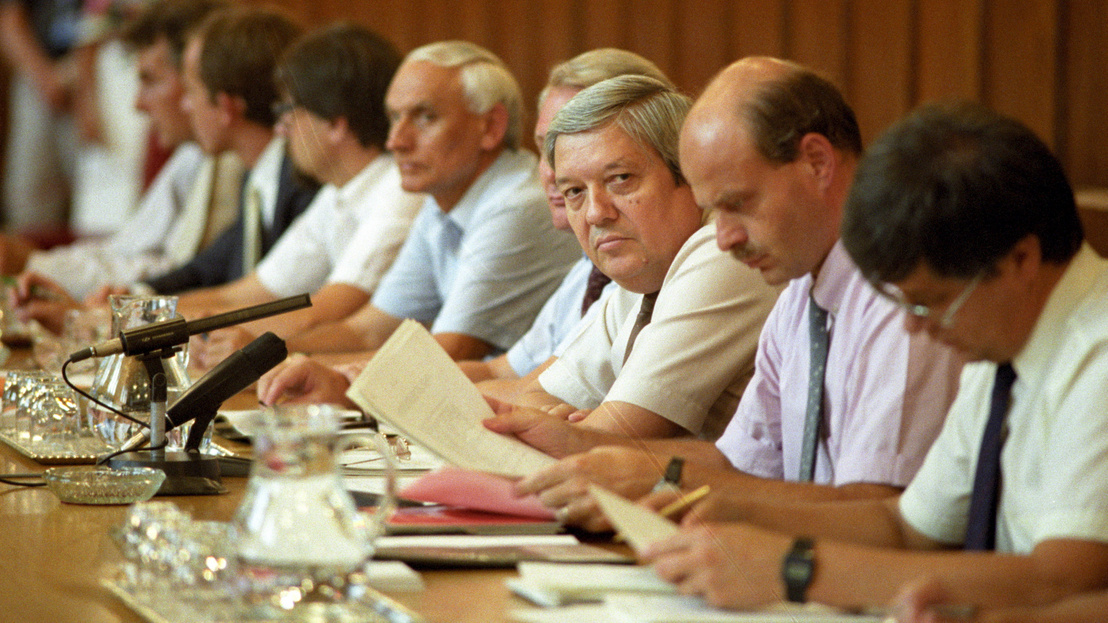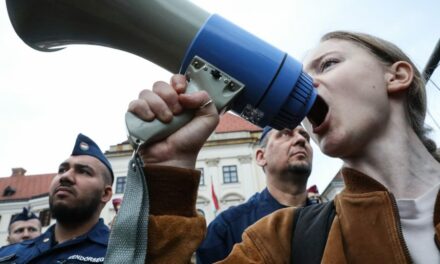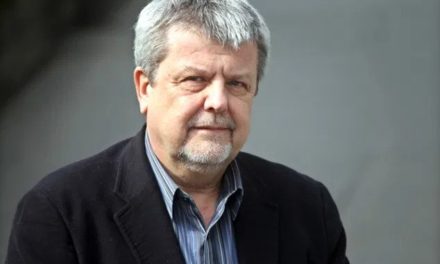Imre Pozsgay, the former minister of culture of the party state, the first faction leader of the MSZP in the democratic parliament, would be 90 years old today.
For those under thirty, his name might not mean much - thirty-five years ago, however, Pozsgay was the best-known and perhaps the most popular politician in Hungary.
During the reign of terror of Mátyás Rákosi, he came to the Soviet Union and graduated from the Lenin Institute, a cadre training school of the empire. Pozsgay returned home in 1957 during the retaliation of the revolution and began his career in the nomenclature of the state party. This is how he described '56:
"Could we have had a revolution in October 1956? Where can the change of production conditions and the overthrow of the ruling class lead us? – (We said that this is what revolution means.) Such a step could only lead to the restoration of capitalist relations and bourgeois rule, and would still lead today. This, on the other hand, is pure, sterile counter-revolution."
Imre Pozsgay's path took a turn from there until January 28, 1989, when he called '56 a 'popular uprising' on Magyar Rádio. The legitimacy of the Kádár regime rested on the stigma of '56.
In January 1989, Pozsgay, with a single word, demonstrated exceptional courage, knocked out one of the pillars of the system: from that moment on, events led unstoppably into regime change.
Pozsgay spent the period of the Kádár consolidation at the Bács-Kiskun County Committee of the state party. Here he made an alliance with - among others - István Horváth, the later Minister of the Interior. The reform course flew him to the party center, then he was deputy minister for a short time, and then minister of culture in the Lázár government. In 1980, the archetype of the people's communists, Lajos Fehér, who had fallen out of favor, recommended Imré Pozsgay, a new KB member, to the Political Committee¹, as if he were his own political heir. Kádár swept the proposal off the table, and two years later - by then Fehér was dead - he "exiled" Pozsgay to head the Patriotic People's Front. Pozsgay made a virtue out of necessity. He wove his political web in the "shadow" of the People's Front, and by the end of the decade his "tentacles" had reached almost every opposition organization and start-up party. In the meantime, he did not build up at all in the nomenclature, and this omission at the historical turning point was a fatal blow to his career. Until then, however, Pozsgay was the "reform communist star" in late-Cádár Hungary.
In the second half of the 1980s, fellow intellectuals lay at his feet, and in the nascent opposition movements, Pozsgay was the only one who received unconditional respect from the party-state politicians. He went - and thereby provided a protective umbrella - to the housing meeting on September 27, 1987, where the Hungarian Democratic Forum was launched.
At the May 1988 party conference that ended the Kádár era, Pozsgay was finally included in the Political Committee. He joined the Grósz government.
As Minister of State, in November 1988 - at the same time as Miklós Németh replaced Secretary-General Grósz as Prime Minister - he presented the democracy package to the House, from which the first half of 1989 led to the legislation forming the first step of the regime change: the constitutional amendments establishing parliamentary governance, the unification, the assembly, strike and referendum laws.
In the spring of 1989, the state party articulated the platform of reform circles committed to the transition to multi-party parliamentary democracy in opposition to Grósz's party leadership, which persisted in favor of the "historically established" one-party system. Imre Pozsgay was indisputably the scapegoat and idol of the reform circles in the beginning. In the meantime, it seemed that Pozsgay was determined to face all eventualities, and called the "Movement for a Democratic Hungary" he launched an initiative outside the state party structure. However, he did not lead the reform circles.
On June 16, 1989, Pozsgay Imre Pozsgay, who played Imre Nagy '57, stood guard at the coffin of the murdered prime minister. He spent the summer of '89 at the National Round Table: Pozsgay played the role of the "good policeman" in the state party delegation. By the time the NEKA negotiations ended in September, the reform circles were occupied by tsinovniks who had just retired from the KISZ, who took Pozsgay's words of May '88 very seriously:
"Even the snake must shed its skin, because it will perish". Pozsgay did not agree to split from the party in September '89, and thus caused great disappointment in the MDF headquarters in Ó utca.
He wanted to be the president of the republic of the regime change, and he thought that, from the point of view of power, the transforming state party provides the optimal basis for this.
The SZDSZ already started "grinding" Imré Pozsgay in the summer of '89. Suddenly, the democratic transformation was feared by the reform communist politician who was preparing to become the president. From today's point of view, it is quite absurd that Pozsgay was amortized more by the liberal actors than Nyerst, Horn, Németh, or Grósz, while there was complete consensus at the National Round Table on the issue that the powers of the president of the republic - completely regardless of the method of election - in 1946 It will be weak, similar to what is written in Article I of the law, so the head of state will not be able to influence the government's actions.
The liberals considered Pozsgay's ceremonial ascension to heaven synonymous with the transfer of power, while at that time spontaneous privatization, the manipulation of KISZ assets, and the formation of the nomenclature bourgeoisie in Hungarian had already been taking place for weeks or even months. When on September 18, 1989, at the closing round of the National Round Table, the two liberal delegation leaders, Péter Tölgyessy and Viktor Orbán, announced that they would also initiate a referendum on the election of the president of the republic only after the parliamentary elections, one country could see it live the deathly pale face of Pozsgay. The result of the four-way referendum on November 26 completely shattered the presidential ambitions of Imre Pozsgay.
Let there be no misunderstanding: reform communists agreed that as much as possible should be saved from the hegemonic position of the transforming pro-state organizations – of course, strictly within the Western-style rule of law scenery – to the new Hungarian democracy. There were a few exceptions, such as Imre Keserű, a drama teacher from Szentes, or Ferenc Gyurcsány, who left the KISZ successor organization with an existential leap of death, but none of the emblematic leaders were among them. Neither did Imre Pozsgay.
At the meeting of the Political Steering Committee of the state party on September 19, Imre Pozsgay recalled that he defended the preservation of the material foundations of the hegemonic role at the NEKA negotiations:
"Their request was that, until the new Parliament convenes, the MSZMP should show restraint and pause the distribution of its assets and the creation of sources of income, we did not undertake this and we did not go into this"².
The split between the reform communists and Grószék can actually be seen in the fact that the latter wanted to preserve the hegemonic role and avoid regime change with public law safeguards (see: maintain the party's leading role in the constitution). The reform communists, on the other hand, wanted to be at the forefront of the "inevitable", so that they could control the transition and shape the new system in their image. However, Imre Pozsgay did not calculate at all with the two unique features of the Kádár state party. After Kádár '56, he leached the Marxist-Leninist underground from an ideological point of view, stripped it of all moral connections and drowned the power politics of the nomenclature in pure pragmatism. And this nomenclature proved to be more open and adaptable to Western capital expansion than all regional power machines.
In 1989, Pozsgay spoke about the national interest in front of "comrades" who were waiting for the incoming "working capital" to do business with them.
His ideological position was somewhat similar to that of Iliescu, Milosevic, Mecia, or the young Pawlak, Fico. However, the nomenclature of the Hungarian state party of the 1980s became thoroughly reform-communist in the course of 1989, because for them direct and slavish integration into the global capitalist world order was a stronger guarantee for the maintenance of hegemonic positions - indeed, for the expansion - than material constitutional safeguards.
By the end of '89, Pozsgay practically had only one ally left in the nomenclature: Minister of the Interior Horváth. The Dunagate case in January '90 did not open the state security files, but it brought down the Minister of the Interior. István Horváth disappeared from public life, he was not even included in the national list of the MSZP. After that, Imre Pozsgay, without a base or allies, first became the national list leader of the MSZP, and then - after the elections - the faction leader. In a vacuum, Pozsgay left the successor party in November 1990 for the political no man's land. The MSZP was able to march to the Democratic Charter unhindered. The technocrat successor party became compatible with the liberals.
Pozsgay was only the first, but far from the last, successor party politician to be targeted by liberal politicians and media workers.
During the Horn government, the biggest SZDSZ "project" was about keeping Sándor Nagy away from the government. Sándor Nagy, who came from the head of the trade unions, in contrast to Pozsgay, then to Szűrös and Szili, who were considered to be popular leftists like him, also made a counter-offer to the neoliberal economic dogmas and austerity fetishists. After the turn of the millennium, Sándor Nagy was marginalized in the court of the MSZP just as Mátyás Szűrös, or later, for example, Katalin Szili, Zoltán Király, Mihály Bihari, Istvánné Szöllősi, Tamás Krausz, Ferenc Gazsó, Béla Galló, József Sipos, Albert Alföldi, the Socialist Platform, the Department of Social Policy, the Left Consolidation.
Towards the end of his life, Pozsgay was asked by Viktor Orbán, who shattered his former dreams, to become a member of the "National Consultation Board" and then to participate in the preparation of the Basic Law.
We can be right to wonder how Pozsgay got from the Lenin Institute to the National Consultation, but the fact is that the outside world has changed much more than Pozsgay. Pozsgay shed his skin countless times during his life, but he always remained a popular leftist.
Posterity can criticize Imré Pozsgay for his vanity and the fact that he lacked a decisive socio-economic concept and organizational skills at a turning point behind his romantic rhetoric. His career is still a sad symbol: a memento of the left-wing experiment of the Hungarian patriot who died in ashes.
¹ István Papp: Lajos Fehér – Career profile of a popular communist (ÁBTL-Kronosz Kiadó, Bp.-Pécs, 2017.) p. 396.
² System change (Osiris, Bp., 2018.): p. 461-462.
Featured image: Imre Pozsgay as head of the MSZMP delegation at the National Triangle hearing in the Parliament on August 25, 1989 . Photo: Attila Kovács / MTI












